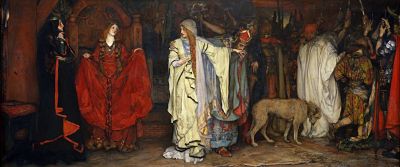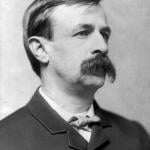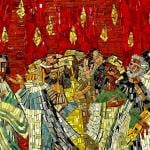
Good luck if an organization is run by a man who wants the treats of power, but not the work. You will need it. Worse luck if you live or work in a culture of fear where the boss demands loyalty that he tests through tricks, arbitrary rules, and where hurt feelings can be fatal.
King Lear decided his time as king was done, but instead of abdicating (as he should have), this foolish ruler divided his kingdom between his daughters. Even worse, he demanded his daughters flatter him before ceding authority.
No flattery.
No power.
In such a court or organization no person is allowed to “love and be silent.”
This is a disaster as the Christ-like Cordelia, who really loves her father, shows. When asked by him how much she loves him, Cordelia refuses to flatter like her sisters:
Obey you, love you, and most honor you.
Why have my sisters husbands if they say
They love you all? Haply when I shall wed
That lord whose hand must take my plight shall carry
Half my love with him, half my care and duty.
Cordelia understands that an excess of “love” beyond bounds is a kind of lust. Lust is always driven toward power for self . . . as the two flattering sisters demonstrate later in the play. They say they love totally, so Lear should know they cannot love him at all.
Few Christian leaders admit to liking obsequious behavior and flattery, but too many of us enjoy it in fact. Who hasn’t seen a leader say: “Too much!” while promoting the fellow who lathers on the praise like butter. How can you tell a leader likes flattery? Check out who hangs around. If the opinionated tend to leave “the kingdom,” Lear may be in charge. The worst part of such leadership (God save me!) is that the men and women who really love you tell the truth. They do not and will not flatter the king to get power.
As Kent says:
Think’st thou that duty shall have dread to speak
When power to flattery bows? To plainness honor’s bound
When majesty falls to folly.
Lear, like many bad leaders, will not hear plain truth. He looks for some study, courtier, or new set of facts that agree with his desires. They do not come so Lear loses even his sanity in the pursuit of dreams. Lear banishes all truth tellers and uses pity, pleasing rhetoric, and whining to win sympathy . . . for a time.
Beyond flattery, how did Lear set up his own ruin?
Divide power.
A nation or an organization needs a leader. Lear decides that he will “shake all cares and business from our age, conferring them on younger strengths while we unburdened crawl toward death.” However, later we see Lear partying with his people and interfering with his children’s decisions. They are not free of him, he is just free of responsibility. . . except when he wishes it.
He delegates and then will not let those to whom he delegates power make final decisions. Worst, King Lear sets up two equal states and leaves his best daughter married to major power. Divided power without a strong central leader will soon turn inward searching for guidance.
Drift will come when a “senior pastor” keeps the name, but no longer wishes the power. When Lear says: “only we shall retain the name and all th’addition to a king,” he is living in a fantasy world where great pleasure comes with no responsibility.
If Lear had been otherwise perfect, the situation he created would have failed, but he made it ever worse.
Play off subordinates against each other.
From the start Lear forced his daughters to compete for his favor and he handed out the goodies based on their flattery. He continues to go from daughter to daughter, leaving each when they begin to check his play. When one sister was “in favor,” the other was out.
Run an organization that way and there not just be drift, but civil war driven by fear.
Make decisions in anger.
Lear has decent advisers (like Kent) who would help him, but Lear is a passionate man. He makes his worst decisions in the grip of these passions. Early in the play he says: “Come not between the dragon and his wrath.”
Later like so many bad rulers, he whines when he discovers that few really love him. He keeps servants by pay and power. When the pay and power dry up, so do the friends and followers. Oddly (God’s grace!), the godly few who really love him, like Cordelia, refuse to give up on King Lear.
They love him to the end, even if they are not allowed to prevent his destruction.
There is a sub-plot in King Lear where the Duke of Gloucester is played on by his illegitimate son at the cost of his other son. He too fails by acting in haste, in fear, and with too little information. A leader who acts in passion or anger will rarely make good decisions.
Gloucester seems to examine the case against his good son Edgar, but never considers that he is being played by Edmond (the bastard). A bad leader will become dependent on sketchy or bad men and so come to believe that the good are evil and the evil are good.
Fail to keep up to date on changing circumstances.
The Kingdom of France is a rising power and the King of France has genuine love for Cordelia. He will give her power and honor in his Kingdom.
King Lear seems unaware of the political situation as the play progresses. To him, it is always the day he divided the Kingdom and he does not understand why the change of times has changed his circumstances.
King Lear loved flattery, divided power, played off his daughters and sons-in-law against each other, and failed to note the rise of a threatening foreign power. As a result, he left England vulnerable, ripe for civil war, and his family on the path to annihilation.
Lear’s root problem is diagnosed by one of the “bad” sisters (Goneril): “. . .he hath ever but slenderly known himself.” The quest to know self is not staring within to increase self-esteem. Lear starts the play with too much esteem . . . instead as the ancients knew to know self is to know how limited, ignorant, and needy we are. To know self is to stand before God and say: “I am weak, but you are strong.”
Christian leaders take note. As a leader I cry: Lord Jesus Christ, son of God, have mercy on me a sinner.
——————————————–
*I use the Folio Text The Tragedy of King Lear as edited in the Oxford Shakespeare: The Complete Works, Second Edition for all King Lear posts.
William Shakespeare went to God four hundred years ago. To recollect his death, I am writing a personal reflection on a few of his plays. The Winter’s Tale started things off, followed by As You Like It. Romeo and Juliet still matter, Lady Macbeth rebukes the lust for power, and Henry V is a hero. Richard II shows us not to presume on the grace of God or rebel against authority too easily. Coriolanus reminds us that our leaders need integrity and humility. Our life can be joyful if we realize that it is, at best, A Comedy of Errors. Hamlet needs to know himself better and talks to himself less. He is stuck with himself so he had better make his peace with God quickly and should stay far away from Ophelia. Shakespeare gets something wrong in Merchant of Venice . . . though not as badly as some in the English Labour Party or in my Twitter feed. Love if blind, but intellectualism is blind and impotent in Love’s Labours Lost. Brutus kills Caesar, but is overshadowed by him in Julius Caesar. We should learn not to make Much Ado about Nothing. We might all be Antony, but if we would avoid his fate then we must avoid flattery and the superficial love of Troilus and Cressida. We are fools, but our goal should be to accept it and not to degenerate into Biblical fools during our Midsummer Night’s Dream. Richard III is a symptom of a bad leadership community, but be careful that use Measure for Measure to guide your reaction to the mess. The modern university is Iago in Othello playing on our sins to destroy the nation. You can’t accumulate your way to a great leader and personal piety in Henry VI (Part I) is not enough to make a great king. God will save the King, not our stupid partisan squabbles seen in Henry VI (Part 2) and not kingmakers as existed in Henry VI (Part 3). Fortunately, in God’s world All’s Well That Ends Well. Two Gentlemen remind me that being in love is grand. King John keeps winning and so loses. Slander always gives way to truth in Cymbeline. We need patrons, but God help us if we flatter them and lose them as Athens did with Timon of Athens. We need good leaders and not have to hope against reason that one turns out well like young Prince Hal in Henry IV Part One. Being powerful is all fun and games, until it isn’t as Henry learns in Henry IV Part Two. Virtue can be jolly and edgy, as The Merry Wives of Windsor show. We can all be shrews and need The Taming of the Shrew. Pericles did not live in a Zootopia, his world was more realistic. No revenge lest we end like Titus Andronicus. Shakespeare shows what the fusion of Christianity and classicism did for all of us in Venus and Adonis. It is hard to be delivered from evil, if we pursue it as did the evil man in The Rape of Lucrece. God save us from the leader like King Lear who rules by tricks and fear.











